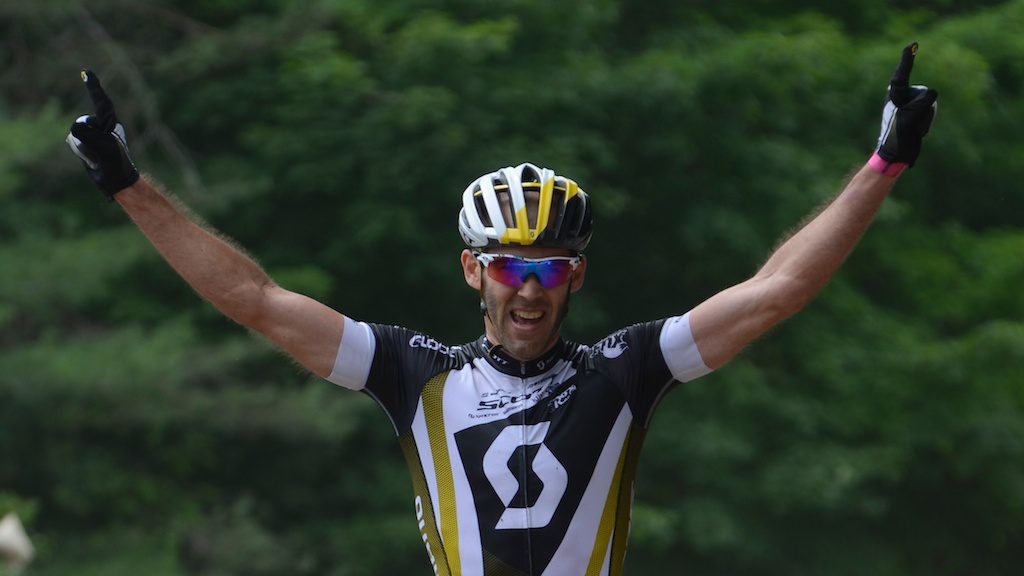During winter training, B.C. powerhouse Geoff Kabush prefers to stay outdoors—if possible
When it comes to training indoors over the winter, B.C.'s Geoff Kabush has a simple philosophy: whenever possible, he avoids it, favouring other, more mobile ways to stay in shape during the colder, darker months.


When it comes to training indoors over the winter, B.C.’s Geoff Kabush has a simple philosophy: whenever possible, he avoids it, favouring other, more mobile ways to stay in shape during the colder, darker months.
It’s something that seems to speak to his West Coast ruggedness—a quality that serves him well as one of the country’s top ‘cross and cross-country riders, having recently turned in a powerful second-place finish at the 2015 Winnipeg cyclocross nationals. With the upbringing that comes from having mountains in one’s back yard, Kabush is also aware that other, less-wheeled forms of recreation play a part during the off-season, at least when the conditions aren’t conducive to hopping in the saddle.
“If there is any way to avoid the trainer,” Kabush recently told Canadian Cycling Magazine,“I usually do. Clothes are so much better than they used to be, so if I can, I’ll always opt for outside. If it is too crappy to ride, that usually means it’s good weather for skiing.”
Diversifying his athletic portfolio during the winter months, Kabush suggests, is never a bad approach to staying in top cycling form.
“I think it is always a great idea to get some time on the Nordic sticks or find some friends for some back-country touring, if possible,” he said, adding that the option he has to head south for training, where the snow might be such an issue, might not be as readily available for others. In those situations, he says, the trainer may be the best option. “Regardless,” he says, “I think the goal for training in the winter remains the same: building a good foundation for the summer racing season.”
“The biggest challenge in the winter,” Kabush adds, “is doing the work and hours needed without mentally burning out; you need to remember that training isn’t over when the season starts and you don’t want to be at the end of your mental rope come April.”
During winter, he explains, training is as much a mental undertaking as a physical one, and for that reason, he says it’s important to diversify one’s activities when it comes to winter pursuits—so to speak, at any rate. Still, it’s important to keep rooted in that which will be the most important come April, but if choosing the trainer, not to enthusiastically overdo anything. “When I do some off the bike activities,” Kabush explains, “I think it is a big benefit to hop back on the bike after to work the co-ordination of the cycling muscles. The temptation can also be to go hard and do intensity on the trainer, but you have to ask yourself if that is what the goal is.”
“Definitely some intensity in the winter is good, but maybe not every time you jump on the trainer,” Kabush said.
For the Vancouver Island trail-shredder, the question is less about going hard, burning away the cold of winter with the heat of intense physical training, and more about striking a disciplined, productive balance. Pacing himself, he says, keeps things in good working order for when power in the saddle matters most.
When he does hop on the trainer, though, he describes the experience as somewhat mind-numbing, meaning he mixes up his regimen with specific co-ordination exercises to keep things interesting—and also to pass the motionless indoor time. Every five to 10 minutes, he explains, he’ll do one-leg riding, then high cadence and low cadence, slightly shaking up the intensity. “Anything to change things mentally while still working on the goal for many rides, which is building basic endurance,” he said.
What helps him? “Certainly lining up entertainment like movies, podcasts and replays of old races can be motivating. There is nothing like making it more social, so certainly group indoor training can be a huge benefit mentally and for motivation as well.”
